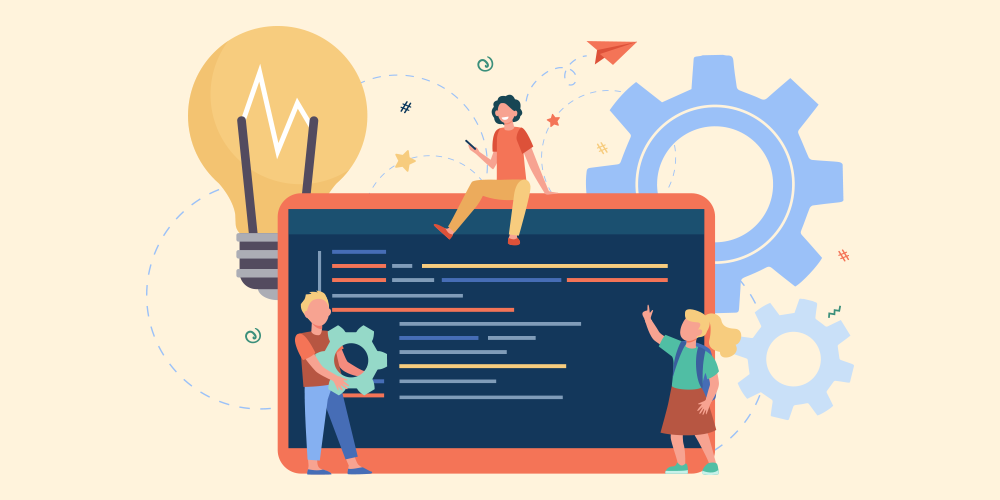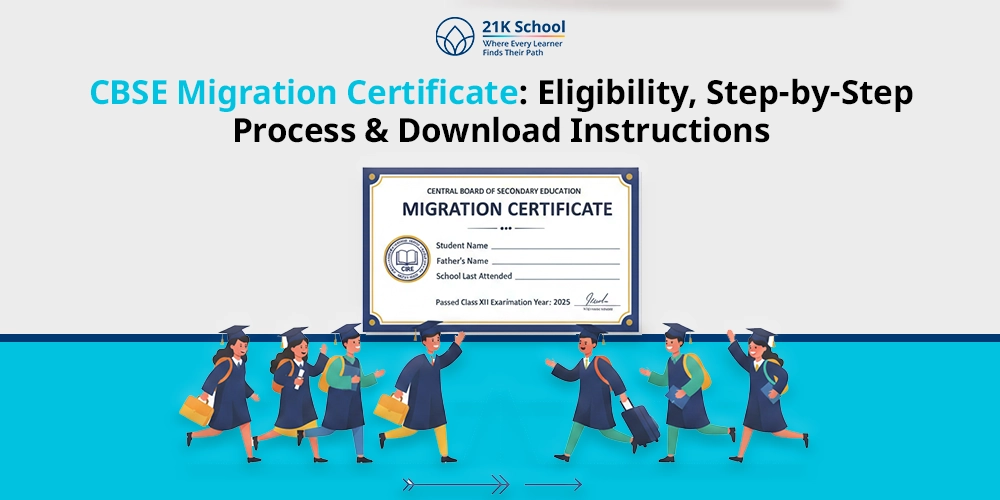
We are living in an era of digitalisation, where technologies from all directions surround us. In this modern world, computer coding has become an important skill for students and children.
Earlier, this skill was considered very hard and impossible, and thus, very few people could learn it. However, things have changed now.
Today, coding is an essential skill that not only helps in communicating with machines but also helps in the overall development of an individual.
By teaching coding to children , you can help them in many ways. In this article, we are going to discuss the importance of coding and the reasons why you should teach coding to your children .
Contents
- What is Coding?
- What Skills Does Coding Develop?
- Importance of Coding for Children
- 1. Helps in Building Confidence
- 2. Helps in Building Rational Logic
- 3. Makes Great Problem Solvers
- 4. Improves Academic Performance
- 5. Makes Them Creative
- 6. Computational Thinking
- 7. Entrepreneurship and Job Security
- 8. Makes Math More Fun and Engaging
- 9. Teaches Collaboration
- 10. Using in STEM Education
- 11. Improves Storytelling
- 12. Develops Critical Thinking
- 13. Algorithmic Thinking
- 14. Improves Communication
- 15. Enables Entrepreneurship
- The Practical Uses of Coding
- Getting Students to Code at an Early Age
- Using Coding to Empower
- The Continued Evolution of Coding
- Final Words
What is Coding?

Coding, also known as programming, is the process by which sets of instructions for COMPUTERS are written. These instructions are usually in programming languages that include Python, Java, C++, and others.
Coding is the foundation of today’s computers, driving the functionality of software applications, websites, and digital systems.
Coding at its roots, is a process of designing an algorithm that incorporates problem-solving, logic, and even creativity to develop software that can accomplish set goals or solve certain problems.
What Skills Does Coding Develop?
Coding is more than just a technical skill; it fosters a variety of competencies that are essential in the modern world.
1. Problem-Solving
As with any problem-solving approach, coding involves the process of subdividing a problem into many small sub-parts and finding separate solutions to each sub-problem.
Such a systematic approach helps to fine-tune the skills in critical analysis and problem-solving.
2. Creativity
Software and application development are creative processes that require innovative ideas, among other things.
If coders are to come up with solutions to a certain issue or to achieve a given goal, then they have to do so in a creative way to meet the needs of users.
3. Persistence
Debugging and testing code could be among some of the difficult tasks. Coding requires solutions, and when a programmer gets stuck at a certain level, coders learn not to give up easily.
4. Collaboration
Collaboration is common for coding projects as well; Coders also build their team skills as they solve problems and navigate how to interact with one or many other individuals.
5. Career Flexibility
Coding is the universal language for any web development, UX design, app creation, etc. Due to its versatility and expertise in multiple fields, it gives students a wide range of options for switching careers.
Find if studying game development is a promising career path .
Importance of Coding for Children
Coding is no longer just an added skill. It has become the new epitome of proving digital literacy to the industries.
Along with creating surreal job opportunities in the market, it has added to the overall development of kids.
Below is everything about coding and its importance for children and students:
1. Helps in Building Confidence

The biggest importance of coding is that it helps in making children more confident .
Most of us learned operating basic machines like computers and mobile phones after crossing our teenage years. Not to mention, this led to many challenges at the workplace as well.
But today’s children are different; they are exposed to a technology-rich environment. By helping them learn coding and programming, you can make them well-equipped to survive in this technology-driven world and become more confident.
2. Helps in Building Rational Logic

Note that coding involves more use of the left or rational side of your brain, which is used for applying logic, linear thinking and sequencing in most situations.
Kids, on the other hand, use more of their right side of the brain to solve problems with the help of visualization, imagination and intuition.
Modern kids are very intelligent. When you provide them with the basic know-how and knowledge, they can master coding and programming.
To program a system, one should be able to break down problems in a structured way and use a structured set of instructions. This is where the importance of coding comes to light. It allows children to look at problems in a more practical way.
3. Makes Great Problem Solvers

When they learn to code, they get to understand that there is not only one way of solving a problem, even if their way doesn’t work. When their method fails, they learn and apply another method instead of giving up.
They improve themselves while dealing with problems and stop worrying about their failures.
4. Improves Academic Performance

Children who learn to code also learn how to organize their thoughts in a better way. This improves their thinking and writing skills and supports overall academic growth and performance.
5. Makes Them Creative

Children learn through experimenting and creatively organizing codes to reach the desired output.
Coding is like a brain exercise that helps in opening different dimensions of the brain and allows kids to think from a new perspective. This makes them creative and innovative. They start thinking out of the box and become more sharp and logical.
6. Computational Thinking

Computational thinking comprises diverse ways of thinking like abstract, pattern recognition, and algorithmic thinking when solving problems. Learning to code assists students in developing these skills and exposes them to the fact that to solve any problem.
There is a definite way they have to follow and the steps they should follow to reach a particular solution. This approach is not only necessary for computer science but also is helpful in numerous cases irrespective of the field.
7. Entrepreneurship and Job Security

In terms of employment opportunities, the aspect of coding talent in the current society is highly valued. Programming, data science, AI, and IT security occupations are well-paid and currently have a lot of demand.
When children learn how to code they can gain employment and obtain job experience in various professions thus becoming more sure of employment.
Moreover, it is important to code as it helps people to create and develop their tech-based businesses by providing individuals with the means to innovate and become entrepreneurs, thus contributing to economic development.
Go through these future technology jobs in the 21st century that require coding as a primary skill.
8. Makes Math More Fun and Engaging

Mathematics is inherent in computer programming as a digital language. One advantage that stems from learning coding in mathematics is that even if a certain concept in mathematics is quite abstract, it can easily catch the child’s interest.
For example, coding can assist students in solving mathematical equations by illustrating such problems and thus enhancing their understanding of such concepts and facts. The concept of taking a practical approach to the teaching of Mathematics through coding can help in making the teaching and learning processes more fun-filled activities.
Read more on Coding and Math , How related are these fields?
9. Teaches Collaboration
Coding is perhaps an individual affair; however, it can be collaborative, particularly when applied in the real world. Children participate in group coding projects, train how to share their ideas, listen to others, and pursue a shared purpose.
Be it developing a web-site, a game, a model robotic, team work is essential. Collaborative coding environments like Scratch for Teams, pair programming in Code.org, and LEGO robotics challenges have kids work together.
They do these challenges to construct, work together to debug, and bask in the glory of success together. This enhances their socialization ability and makes them effective communicators as individuals and team players.
10. Using in STEM Education

Computational thinking and coding are essential to STEM -Science, Technology, Engineering and Mathematics. Educators can guide students to draw relevant conclusions between abstract concepts in STEM and the real world.
This can be done by exposing children to coding at an early age.
For example, coding could be used to model scientific experiments, solve mathematical equations, or create engineering prototypes with 3D models. Such an interdisciplinary approach can make STEM subjects more exciting and also equip students with jobs in the technical direction.
11. Improves Storytelling
Coding does not only have to create apps or games, it can also be used as a new way of storytelling. With Scratch, Hopscotch, and Twine, children can create interactive stories, where they do not just write stories but also:
- Animate
- Manage sounds
- Incorporate user interactions
Through this process, narrative structure, sequencing, cause and effect relationships, and expression of emotion develop. Basically, children are turning into digital storytellers, combining creativity and logic, improving their coding and language abilities.
12. Develops Critical Thinking
Critical thinking refers to the capacity to analyze information, make informed decisions and resolve problems tactically. This skill is naturally encouraged through coding since children have to:
- Think logically when analyzing problems
- Put tasks into steps
- Exposure to patterns and inconsistencies
- Select the most appropriate way of coding
To illustrate, when a child codes a game and something does not work, they need to investigate the issue. Further, making a hypothesis about what did not work, and test the hypotheses.
This back-and-forth procedure develops a methodical and logical way of thinking – critical in studies and life.
13. Algorithmic Thinking
Algorithmic thinking is a skill to develop step-by-step procedures to accomplish a task, which is what coding is anyway. By coding, children discover how to arrange their ideas in a rational flow, which enhances planning and productivity.
As an illustration, to tell a robot to get to point B starting at point A. The following steps and choices have to be exact: “forward 2 steps, right, repeat.”
This increases their capability in not only solving coding problems but also in real-life issues that need a logical implementation.
14. Improves Communication
By learning to code, kids also learn the art of communication, and that too in a concise manner. Computer programming languages are exacting-one misplaced character, symbol or structure and the code will not function.
The field makes children more proficient in planning what they have to say and say it in a better manner. Additionally, as children describe their code to others, they learn to communicate technical processes, so that other people can follow.
This enhances verbal and written communication.
15. Enables Entrepreneurship
Coding is an early access to entrepreneurship. Kids can make their personal websites, develop games, or create mobile applications.
These products that they create can be shared with others or even sold. Most of the successful entrepreneurs started coding when they were in their early teens, and passion projects became startups.
Getting children to pursue entrepreneurial coding projects develops creativity, financial literacy, independence, and confidence in kids. It will enable them to be makers and not only consumers of technology.
The Practical Uses of Coding
- Mobile web and app development: Every website or mobile app is made using coding language. For frontend development, you need HTML, CSS and JavaScript and for backend, choose Python, PHP and Node.js.
Data Science means working with data, while AI is all about making computers do intelligent things.
The processes of data analysis, machine learning and AI depend on coding. Python and R are popular choices when creating models to influence business moves, analyze medical conditions and other purposes.
- Game Development: Interactive games and virtual experiences can be made with the help of coding. Because Unity relies on C# and Unreal Engine uses C++, developers can make very interactive environments.
- Automation and robotics: By coding, people can control robots and automate work which leads to greater achievement and higher accuracy.
- Cybersecurity: Developing secure systems, locating vulnerabilities and fighting cyber threats are organized in code by cyber security experts.
Getting Students to Code at an Early Age
An increasing number of people agree that kids should start learning coding as early in school as possible. Programming has already been included in school programs in the UK, Estonia and Singapore.
According to the NEP 2020, coding is made mandatory in India’s education system from the middle-school stage.
Why Is Teaching Kids to Code Useful?
- It increases your kids’ self-confidence as they work on your projects.
- Helps learners build skills such as critical thinking and know how to use computers and the Internet.
- Helps students get ready for what they might face in future job situations.
- Teamwork, communication and collaboration are supported by the game.
- Scratch, Blockly and Code.org are popular choices since they make coding both interesting and simple even for early learners.
Using Coding to Empower
- For Entrepreneurs: Anyone who knows some coding can experiment with ideas, make a working product and need fewer developers in the beginning. A lot of successful startups began because of technical founders who knew how to code.
- For Women and Underrepresented Group: Due to the remote and flexible nature of programming, along with high pay, it is especially helpful for women and those in rural or underserved areas.
- For Self-Learners: There is no need for a formal education to get into programming. Many people who teach themselves coding have gotten jobs, started their own businesses or helped with open-source projects by practicing online.
The Continued Evolution of Coding
1. New Technology and Coding
The growth of technology will lead coding to take on a bigger role in:
- Quantum computing
- Augmented reality and virtual reality
- Blockchain and decentralized apps
- The Internet of Things
2. No-Code and Low-Code Development
Although no-code solutions make some development easier, knowledge of code will remain crucial for making projects more effective and flexible.
3. Can we write code using AI?
Although AI tools help generate code with GitHub Copilot, they are not capable of doing so on their own. Coding will play a key role in allowing people to design smart systems, not only use them.
Final Words
Besides being a useful skill in programming, coding enables creating, thinking logically and bringing about innovation.
It makes it possible for individuals to address issues, state their ideas and play a role in tomorrow’s world.
Since we rely so much on digital solutions today, learning about code is crucial. No matter if you’re studying Scratch, using Python professionally or helping your child discover IT, coding can lead to many new possibilities.
It inspires people to be open-minded, strong and creative which is helpful in any field. Spending time to learn to code this year will help you become more capable, confident and digitally able in the future.


